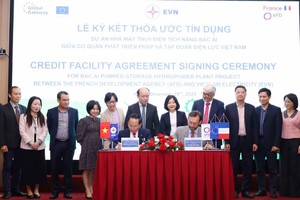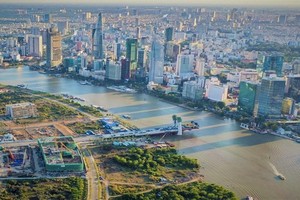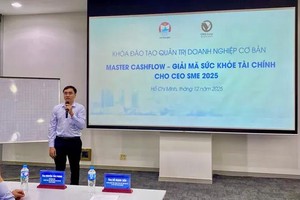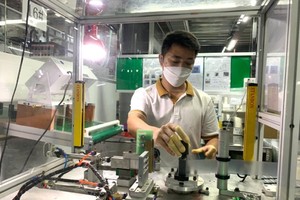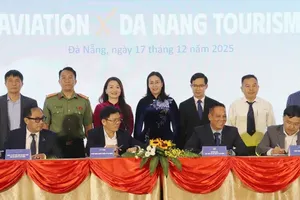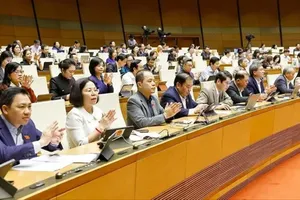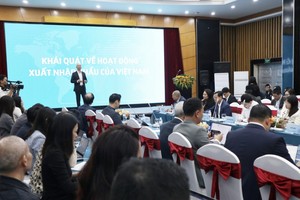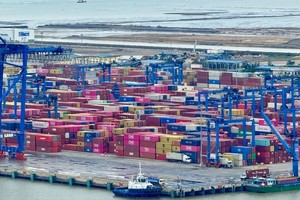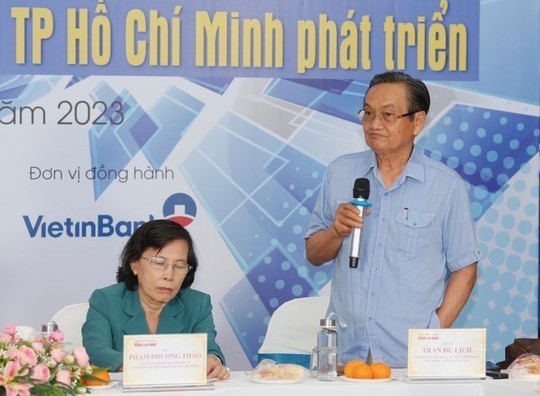 |
Dr. Tran Du Lich, a member of the National Financial and Monetary Policy Advisory Council, speaks at the seminar. |
At the seminar titled "Removing obstacles, promoting economic development of Ho Chi Minh City", organized by Nguoi Lao Dong (Laborer) Newspaper on May 16, Dr. Truong Minh Huy Vu, Deputy Director of the HCMC Institute for Development Studies, highlighted the challenging economic situation. He mentioned that all forecasts indicate economic difficulty. In particular, HCMC's economy grew by only 0.7 percent in the first quarter of 2023, clearly reflecting this situation.
Currently, HCMC is making strong efforts to accelerate public investment disbursement, but only the disbursement rate of the Ring Road No.3 project has shown a significant increase. Progress in the districts is still sluggish due to the lack of active participation from local authorities.
Dr. Tran Du Lich, a member of the National Financial and Monetary Policy Advisory Council, shares a similar viewpoint, stating that HCMC's economy experienced a significant decline in the first quarter of 2023. With its special openness, HCMC prospers when the macroeconomic conditions are favorable but faces disadvantages when conditions are unfavorable. Overall, the economic outlook for the first four months of the year is not promising.
According to Dr. Tran Du Lich, there is an opinion that the economy could pick up from the end of the second quarter of 2023, but this is highly unlikely if it is based solely on a few market indicators. While the revenue from goods and services in the first quarter of 2023 showed positive growth, it started to slow down in April, indicating a low market purchasing power. The tourism market experienced some initial recovery, but the number of tourists has been gradually decreasing. Additionally, the pillars of export and public investment have not seen any significant increase.
To expedite economic recovery, Dr. Tran Du Lich recommends increasing market purchasing power through the implementation of domestic demand stimulus policies using tools from both the government and businesses. Specifically, the government should continue to study the reduction of value-added tax (VAT) by industry, as the recent reduction to 8 percent is not sufficient, and further reduction to 5-6 percent is necessary to stimulate domestic market demand. Additionally, efforts should be made to promote consumer credit and encourage businesses, including the tourism sector, to engage in campaigns that offer price reductions. Neglecting domestic market stimulation in the current challenging export environment could lead to inventory constraints and significantly impact production and business operations.
Alongside resolving immediate issues, it is crucial for the authorities to implement structural solutions to attract public investment, particularly in the real estate sector. Dr. Tran Du Lich emphasized that revitalizing the real estate market is essential, as its stagnation would greatly affect associated businesses.
In relation to market revitalization, Assoc. Prof. - Dr. Tran Dinh Thien, former Director of the Vietnam Institute of Economics, highlights the substantial risks in the domestic market while the global market continues to experience volatility. Furthermore, policy risks pose a concern as recently implemented policies are frequently revised, creating challenges in overcoming obstacles. As a result, many units are hesitant to take action due to uncertainties surrounding policies. Consequently, it is imperative to recognize and address these issues effectively.
Specifically, HCMC has put forth numerous commendable initiatives in recent times, such as the urban government model, but they have not been effectively implemented. The existing growth constraints and obstacles, including traffic congestion, flooding, and insufficient infrastructure, have not been adequately addressed and, in some cases, have even worsened. Additionally, there is a dearth of new driving forces to stimulate further development in the city.
To achieve significant progress, HCMC requires pioneering projects like the Can Gio International Transshipment Port, the international financial center, and the commercial center, supported by institutional breakthroughs to attract major investors to the city. It is because the challenges faced by HCMC are not confined to the city itself; they are also national concerns. Breakthrough mechanisms and policies for HCMC have implications for the entire country, as the city plays a pivotal role as the nation's leading locomotive. Only when the locomotive gains strong momentum can it propel the entire train forward.
